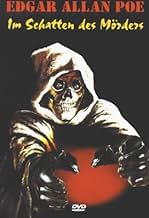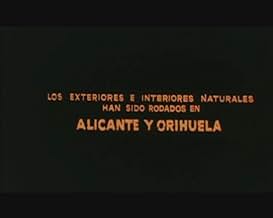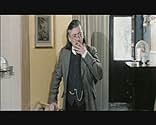After the murder of a rich family patriarch, the reading of his will brings a motley crew of greedy family members to a mansion by the sea to collect.After the murder of a rich family patriarch, the reading of his will brings a motley crew of greedy family members to a mansion by the sea to collect.After the murder of a rich family patriarch, the reading of his will brings a motley crew of greedy family members to a mansion by the sea to collect.
Alberto Dalbés
- Major Oliver Brooks
- (as Alberto Dalbes)
Evelyne Scott
- Lady Marta Tobias
- (as Evelyn Scott)
Ángel Menéndez
- Lord Archibald Marian
- (as Angel Melendez, Ángel Meléndez)
Ricardo Vázquez
- Comisario
- (as Ricardo Vazquez)
Jesús Franco
- Andy
- (as J. Franco)
Dan van Husen
- Albert Pagan
- (uncredited)
5.4586
1
2
3
4
5
6
7
8
9
10
Featured reviews
Jesus Franco's Gothic giallo.
"Night of the Assassins" is an atmospheric Spanish giallo made by a prolific exploitation filmmaker Jesus Franco.The the film is largely based on a book by famed English crime novelist Edgar Wallace.The plot of John Willard's famous 1922 stage play "The Cat And The Canary" is an inspiration too in which a group of greedy relatives gathered at a spooky old mansion for a will reading are systematically murdered by a masked killer who's concealed identity holds the key to the macabre mystery.The assassin wears a human skull mask and is particularly merciless."Night of the Assassins" is an atmospheric and stylish giallo with very good performances and the aura of creeping mystery.The killings are bloodless and the lack of sleaze may be disappointing for fans of Franco's graphic exploitation,but I enjoyed this little macabre film.8 out of 10.
Better than your average Franco flick!
Jess Franco made a lot of films that are liable to make you want to claw your eyes out; but then he also made a lot of films that made you wish he took more care of his overall filmography as the man clearly had talent. Night of the Skull is firmly in the latter category; as while the plot is not particularly original and has been done many times before and since; Franco makes good of it and Night of the Skull is a very successful thriller overall. The basis for the plot takes influence from the often used idea of a will reading causing trouble within a family. The film takes place in England and we focus on the residents of an old castle. The Lord of the manor, Lord Archibald Marian, has been murdered. As the family gather for the will reading, they are shocked to learn of two wills; one to be read in the case that the Lord was murdered, the other in the case that he died of natural causes. The family are shocked further when all of his assets are left to his illegitimate daughter, but there are twists in store before the will can be executed.
The film gives a writing credit to the great Edgar Allen Poe for his story "The Cat and the Canary", although clear influence is taken from crime writer Edgar Wallace and indeed his novel "The Terror" (which was adapted in 1965 as The Sinister Monk) features basically the same story. The film has some similarities with the Giallo genre also and Giallo fans will no doubt enjoy this one too (genre entries such as The Weekend Murders and Deadly Inheritance also use the same base for a plot). The film is set in England and Franco takes care with his setting and the film does actually have an English feel; despite the fact that all the characters speak Spanish. Franco also creates an effectively creepy atmosphere that benefits the film immensely. The film is of a higher quality than a lot of Franco's stuff also - with the acting from the ensemble cast being well above par. The storyline is interesting for the duration despite the fact that it will be familiar to most genre fans; and the ending does deliver something of a surprise. It's an unlikely way for the tale to end, but at least it sort of makes some sense. Overall, Night of the Skull is a very decent thriller and comes recommended.
The film gives a writing credit to the great Edgar Allen Poe for his story "The Cat and the Canary", although clear influence is taken from crime writer Edgar Wallace and indeed his novel "The Terror" (which was adapted in 1965 as The Sinister Monk) features basically the same story. The film has some similarities with the Giallo genre also and Giallo fans will no doubt enjoy this one too (genre entries such as The Weekend Murders and Deadly Inheritance also use the same base for a plot). The film is set in England and Franco takes care with his setting and the film does actually have an English feel; despite the fact that all the characters speak Spanish. Franco also creates an effectively creepy atmosphere that benefits the film immensely. The film is of a higher quality than a lot of Franco's stuff also - with the acting from the ensemble cast being well above par. The storyline is interesting for the duration despite the fact that it will be familiar to most genre fans; and the ending does deliver something of a surprise. It's an unlikely way for the tale to end, but at least it sort of makes some sense. Overall, Night of the Skull is a very decent thriller and comes recommended.
Murder and Mayhem in the family!
Roger Corman apparently isn't the only director who can do Edgar Allen Poe adaptations, even though he undoubtedly remains the reigning king thanks to his SEVEN masterful films during the early 60's starring Vincent Price. The least you can say about this movie is that it's a likable effort. If you compare the oeuvres of exploitation master Jess Franco and early 19th century author Edgar Allen Poe, an amalgamation of their works seems nearly impossible and ridiculous. And yet, "Night of the Skull" is a very compelling and atmospheric Gothic horror film, worthy of Poe's good reputation and a class above the majority of Franco's other movies. The screenplay is based on Poe's "The Cat and the Canary" and revolves on the despicable Marion family as they gather around to hear the will of the murdered patriarch Archibald Percival. Since his death was unnatural, the inheritors all of a sudden get to hear a completely unexpected testament that divides the family fortune differently. Then at night comes a skull-masked killer to eliminate all the family members in gruesome ways, referring to the four basic elements water, wind, earth and fire. Our good old pal Jess manages to create a wondrously sinister Goth atmosphere, complete with dark mansions near the seaside and loud thunderstorms. There's always a certain level of suspense to enjoy and the murders are impressively barbaric. Especially the first murder, that of the family patriarch, is quite creepy. This movie probably contains the smallest amount of sleaze in a Jess Franco movie ever (even Lina Romay keeps her clothes on at all times, which is truly odd), but there's constant hinting at perverted themes, such as incest, voyeurism and adultery. The decors are great, the acting is more than adequate for once and the recent DVD release looks very nice. This film isn't dubbed, which is a real pleasure. Definitely top 3 Franco material, alongside "Faceless" and "The Awful Dr. Orloff".
"Thoroughly average"
The label "thoroughly average" is borrowed from the Aurum Horror Encyclopaedia and, for once, describes the movie very well.
That does not imply that the movie is without interest. There are nice decors and several interesting scenes, e.g., a man is buried alive with only his hands, which are tied to the back, sticking out of the ground like a cry for help or a women is tied to the rocks and left to the tides. Of course, the movie features also Franco's usual dilettantism such as badly focussed shots.
All in all, it is worth a try. No suspense or blood, though. So, watch it only if your are fully awake.
The already quoted horror encyclopaedia contains a plot summary which differs slightly from what I have seen. This could mean that, as so often, there exist several different versions of the movie.
That does not imply that the movie is without interest. There are nice decors and several interesting scenes, e.g., a man is buried alive with only his hands, which are tied to the back, sticking out of the ground like a cry for help or a women is tied to the rocks and left to the tides. Of course, the movie features also Franco's usual dilettantism such as badly focussed shots.
All in all, it is worth a try. No suspense or blood, though. So, watch it only if your are fully awake.
The already quoted horror encyclopaedia contains a plot summary which differs slightly from what I have seen. This could mean that, as so often, there exist several different versions of the movie.
🎬 The Killer's Night of Mayhem and Intrigue! 🎬
La noche de los asesinos, or Night of the Skull as it's known in English, is a 1974 giallo film directed by the prolific and controversial Jesús Franco. With a filmography ranging from erotic horror to exploitation, Franco is known for pushing boundaries, and this film is no exception.
The movie starts with a warning: "For God's sake, stay in your rooms and lock the doors!" This foreboding message sets the tone for what's to come-a suspenseful, bloody, and mysterious ride. The story unfolds with a series of murders, each more gruesome than the last, as the audience is left wondering: Who is this killer, and what is their motive?
Franco's signature style is on full display here, with a generous helping of his beloved elements: suspense, intrigue, and bloody mayhem. However, this film differs from his erotic horror classics. While it has hints of sleaze and features frequent collaborator Lina Romay, the film surprisingly lacks the gratuitous nudity and overt sexual themes that Franco is known for. Instead, it focuses on building a tense and eerie atmosphere.
The performances in La noche de los asesinos are a standout aspect. The actors, including Romay, deliver above-par portrayals, with the first murder sequence being a highlight. The look of the killer is effectively unnerving, and the ending delivers a surprise that, while unexpected, ties the story together.
However, the film is not without its drawbacks. The storyline, while engaging, may feel familiar to fans of the genre, and some viewers may find themselves predicting certain twists. Additionally, those expecting Franco's usual explicit content may be disappointed by the relatively restrained nature of this film in comparison.
In conclusion, La noche de los asesinos is a well-crafted thriller that showcases Franco's ability to create a suspenseful and intriguing narrative. While it may not reach the heights of his most acclaimed works, it is a solid addition to the giallo genre and a must-watch for fans of suspense and mystery.
The movie starts with a warning: "For God's sake, stay in your rooms and lock the doors!" This foreboding message sets the tone for what's to come-a suspenseful, bloody, and mysterious ride. The story unfolds with a series of murders, each more gruesome than the last, as the audience is left wondering: Who is this killer, and what is their motive?
Franco's signature style is on full display here, with a generous helping of his beloved elements: suspense, intrigue, and bloody mayhem. However, this film differs from his erotic horror classics. While it has hints of sleaze and features frequent collaborator Lina Romay, the film surprisingly lacks the gratuitous nudity and overt sexual themes that Franco is known for. Instead, it focuses on building a tense and eerie atmosphere.
The performances in La noche de los asesinos are a standout aspect. The actors, including Romay, deliver above-par portrayals, with the first murder sequence being a highlight. The look of the killer is effectively unnerving, and the ending delivers a surprise that, while unexpected, ties the story together.
However, the film is not without its drawbacks. The storyline, while engaging, may feel familiar to fans of the genre, and some viewers may find themselves predicting certain twists. Additionally, those expecting Franco's usual explicit content may be disappointed by the relatively restrained nature of this film in comparison.
In conclusion, La noche de los asesinos is a well-crafted thriller that showcases Franco's ability to create a suspenseful and intriguing narrative. While it may not reach the heights of his most acclaimed works, it is a solid addition to the giallo genre and a must-watch for fans of suspense and mystery.
Did you know
- TriviaEdgar Wallace was not credited in this movie, but in an interview with a fan, director Jesús Franco admitted that he used one of Wallace's novels for this movie.
- Crazy creditsThe opening credits claim the story is an adaptation of Edgar Allan Poe's "The Cat and the Canary." There is no work by Poe with that title or plot. It is actually a play written in 1922 by John Willard, which was officially adapted to film in 1927, 1930 and 1979.
- ConnectionsReferenced in Shaun of the Dead (2004)
Details
Contribute to this page
Suggest an edit or add missing content

































